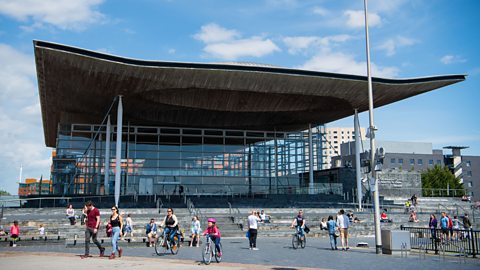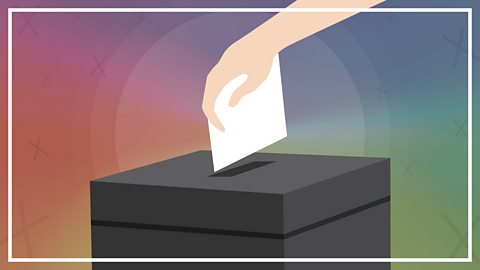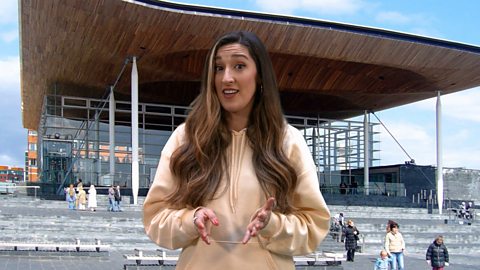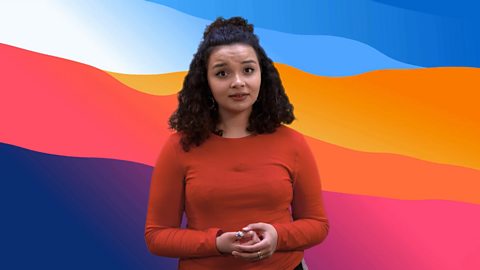Introduction
You may think the political world is full of big words - but they're not as complicated as they sound. Watch the video to try and get to grips with some of them.
This film was produced in 2021 before the changes to constituency boundaries

Learn more about the ten political words or phrases from the video.
10. Government
The government runs the country and it is led by the prime minister.
There is so much work involved in ruling a country, the prime minister needs help. Therefore he chooses MPs from the House of Commons and members of the House of Lords to be ministers.
The cabinet is made up of the prime minister and the most important ministers. Together, the cabinet have the power to make all the UK's governing decisions. It's the cabinet that governs the UK.
In the UK, although Parliament is sovereign, ie itвҖҷs the UK Parliament that has absolute power вҖ“ the government is formed by the party with the most seats in Parliament. As a result, they are pretty sure that they will be able to pass the policies in their manifesto into legislation.

9. Senedd / Parliament
The term вҖҳSenedd / ParliamentвҖҷ has two meanings in Welsh and UK politics and that is why people are often confused.
In the context of the UK, Parliament is the term for the House of Commons and the House of Lords in Westminster. These two chambers are different.
650 MPs, elected by UK citizens, sit in the House of Commons. The benches in the House of Commons are green.
The number of members of the House of Lords is not fixed. There are 92 hereditary peers, 26 Church of England bishops who can sit there because of their position, and about 700 lords who have been nominated by political parties or an independent commission. The House of Lords has red benches.
We have our own Senedd in Wales - Senedd Cymru - where Members of the Senedd (MS) meet to debate. Currently there are 60 members but this will increase to 96 after the next Wales elections in 2026. What both Senedd Cymru and the UK Parliament have in common is that they have the power to make laws.
The Senedd is also the name given to the building in Cardiff Bay where the Welsh Parliament meets.

8. Coalition
A coalition government is formed when more than one political party come together to govern. This is usually because of a hung parliament, when no party has won enough seats to in an election to govern on their own.
The intention in creating a coalition with another party is that they will have over 51 per cent of the seats within a parliament and therefore be able to pass laws more easily.
Benjamin Disraeli said in 1852, вҖңEngland does not love coalitionsвҖқ. The reason for this, in his view, is that a great deal of compromise is needed to form a coalition.
Coalitions are not common to Westminster politics as one party is likely to win a majority of seats under the first past the post system. But between 2010 and 2015 the UK was governed by a coalition between the Conservatives and the Liberal Democrats.
In Wales coalition government is more common as it is less likely that one party will win a majority with the voting system that is used in Senedd elections. The Labour Party has formed coalitions with the Liberal Democrats and Plaid Cymru at different times.
7. First past the post
This is the term to describe the electoral system used in UK general elections. Put simply, this means that the party that wins a simple plurality вҖ“ that is, the largest number of votes вҖ“ wins the election.
If one party gets only one vote more than another, then it wins the constituency.
6. Constituency
This is the geographical area that a Member of Parliament or a Member of the Senedd represents.
There are 650 Members of Parliament (MPs) in Parliament who are elected to represent their constituencies in a general election. 32 of these constituencies are in Wales.
The boundaries of constituencies in Wales are decided by the Boundary Commission for Wales. Changes were made in 2023 with the aim of creating constituencies with a similar number of electors. With the exception of Ynys MГҙn, at the time the changes were made each general election constituency in Wales had between 69,724 and 77,062 electors.
5. Legislation
This is a term that has two meanings. Legislation is the laws created by Parliament, namely Acts of Parliament. It also means the process of creating new laws in Parliament, ie legislating.

4. Council
Councils are local government bodies responsible for local issues. Counties and some villages, towns and cities have their own council.
Citizens will elect local councillors to the councils to make decisions on how to administer public services in the area, for example rubbish collections, local public transport and local leisure services.

3. Opinion poll
Polls are used to find out what the views of the public are. Companies specialising in opinion polls will create a questionnaire asking people a series of questions for them to answer. They will then collate the results to create an overview of public opinion.
Opinion polls are very important to political parties and governments, as they can show how popular they are, how likely they are to win the next election or what the public think of their policies.
2. Policy
Political parties' policies are the ideas they would like to pass into legislation after winning an election and forming a government.
Before an election, all political parties decide what their policies are and put them into their manifesto so that people can find out what they are.
1. Devolution
Devolution means shifting some power from the centre to the edges.
In practice, that means that the UK Parliament has passed some of its powers to Senedd Cymru, the Scottish Parliament and the Northern Ireland Assembly.
Devolution has been central to Welsh politics since 1999 because the Senedd is now responsible for 20 areas, including health, education and transport, that used to be the responsibility of the UK Parliament.
More on Politics and democracy
Find out more by working through a topic
- count2 of 7

- count3 of 7

- count4 of 7

- count5 of 7
